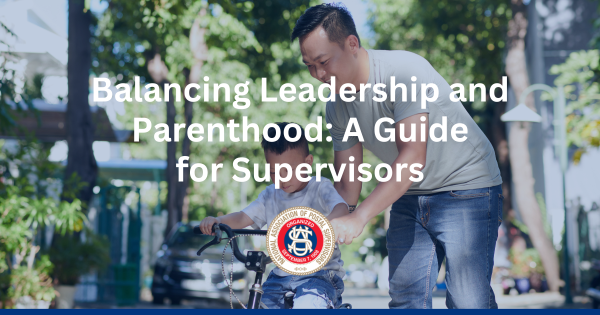Balancing Leadership and Parenthood: A Guide for Supervisors
Submitted by the USPS Employee Assistance Program
Supervisors in the Postal Service are tasked with a significant amount of responsibility. From managing teams and coordinating logistics to ensuring delivery schedules stay on track, their days often are packed. Beyond the demands of the job, many also carry a deeply personal responsibility: raising children.
The Challenge of Dual Roles
Balancing the demands of work with the respon-sibilities of parenting never is easy. While physical needs—such as meals, clothing and bedtime rou-tines—tend to get handled out of necessity, the emo-tional side of parenting often can be overlooked, es-pecially during USPS peak seasons or after long shifts.
Yet, a child’s emotional well-being is just as es-sential as their physical health.It plays a crucial role in how they develop, form relationships and handle life’s inevitable stressors.
Recognizing the Quiet Signs
Children don’t always say outright when they’re struggling emotionally. Instead, they might act out, withdraw, become overly clingy or suddenly have trouble sleeping or concentrating. These behaviors are ways children express that something feels off.
They may be reacting to a parent’s absence or stress or even just the feeling that something in their home environment isn’t quite settled. Recognizing these signs early is key to offering the kind of support that makes a difference.
Small Routines Make a Big Impact
One of the most effective ways to support a child emotionally is by creating stability in their daily life. This doesn’t require grand gestures. It might be as simple as a regular bed-time story, sharing a meal without screens or taking a short walk togeth-er in the evening.
These consistent touchpoints and predictable moments provide a child with something to rely on; some-thing that says, “Even when life is hectic, I’m still here with you.”
Presence Over Perfection
No parent is perfect. What mat-ters most isn’t the quantity of time spent together, but the quality. Even brief moments of genuine connec-tion—undistracted, fully present and engaged—can have a lasting impact.
Asking open-ended questions about their day, listening with inten-tion and responding with interest help children feel seen and val-ued. And when parents are
tired or overwhelmed, being honest about those feelings can be a strength. It teaches children that emotions are natural and manageable.
Helping Kids Understand
Their Emotions Children often lack the vocabu-lary to express how they’re feeling, es-pecially when those emotions are complex—like anxiety, frustration or sadness. Parents can support them by gently naming what they observe: “You seem frustrated” or “You’ve been quiet today, want to talk about it?”
Even if a child doesn’t respond right away, these check-ins commu-nicate care. They build emotional safety and let the child know some-one is paying attention.
Leading with Empathy at Work
Supervisors don’t just influence their homes—they shape the culture of their teams in the workplace. Recognizing that other team members also are juggling family responsibili-ties can go a long way. A simple check-in or a moment of understand-ing can go a long way in building morale, trust and mutual respect.
When leaders model emotional awareness and empathy, it encourag-es others to do the same. The result is a healthier, more compassionate workplace where people feel valued—not just for what they produce, but for who they are.
A Meaningful Investment
Postal supervisors are no strangers to pressure or perseverance. But nur-turing a child’s emotional well-being isn’t about efficiency, it’s about pres-ence, consistency and care. Even with a demanding schedule, small meaningful actions—an encouraging word, a shared laugh, a bedtime chat—can make all the differernce.
These moments don’t just support a child’s growth into a resilient, emotionally healthy person, but also ground parents in what mat-ters most. In the long run, investing in emotional connection benefits everyone: children, parents and the teams they lead.
Support Is Always Available
If you’re feeling overwhelmed or simply need someone to talk to, the Employee Assistance Program (EAP) is here to help. Whether you’re look-ing for parenting resources, stress management support or someone to listen to your concerns, the EAP of-fers free, confidential services for you and your family.
You don’t have to do it all alone—support is just a phone call away: 800-327-4968 (800-EAP-4YOU); TTY: 877-492-7341; EAP4YOU.com.
